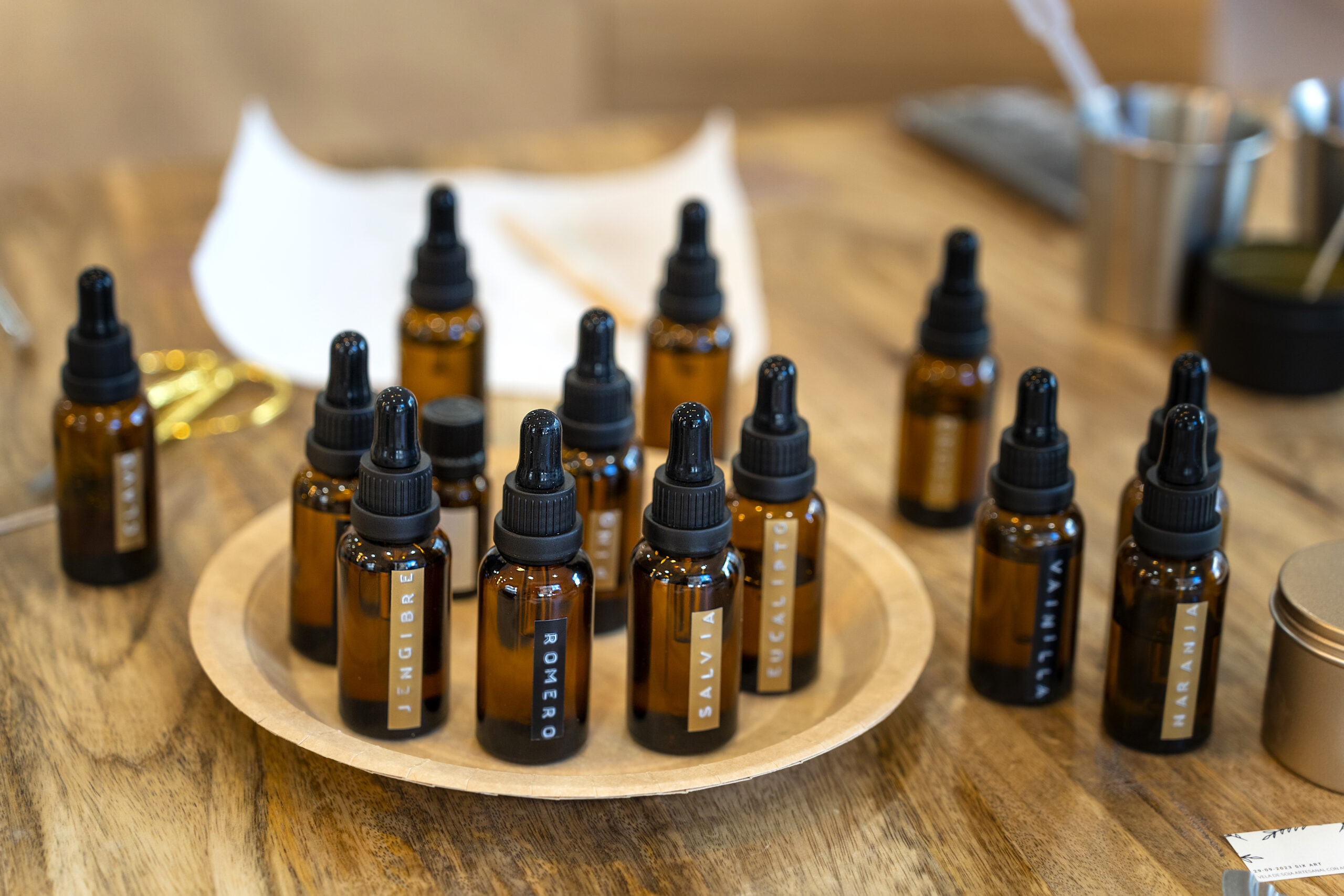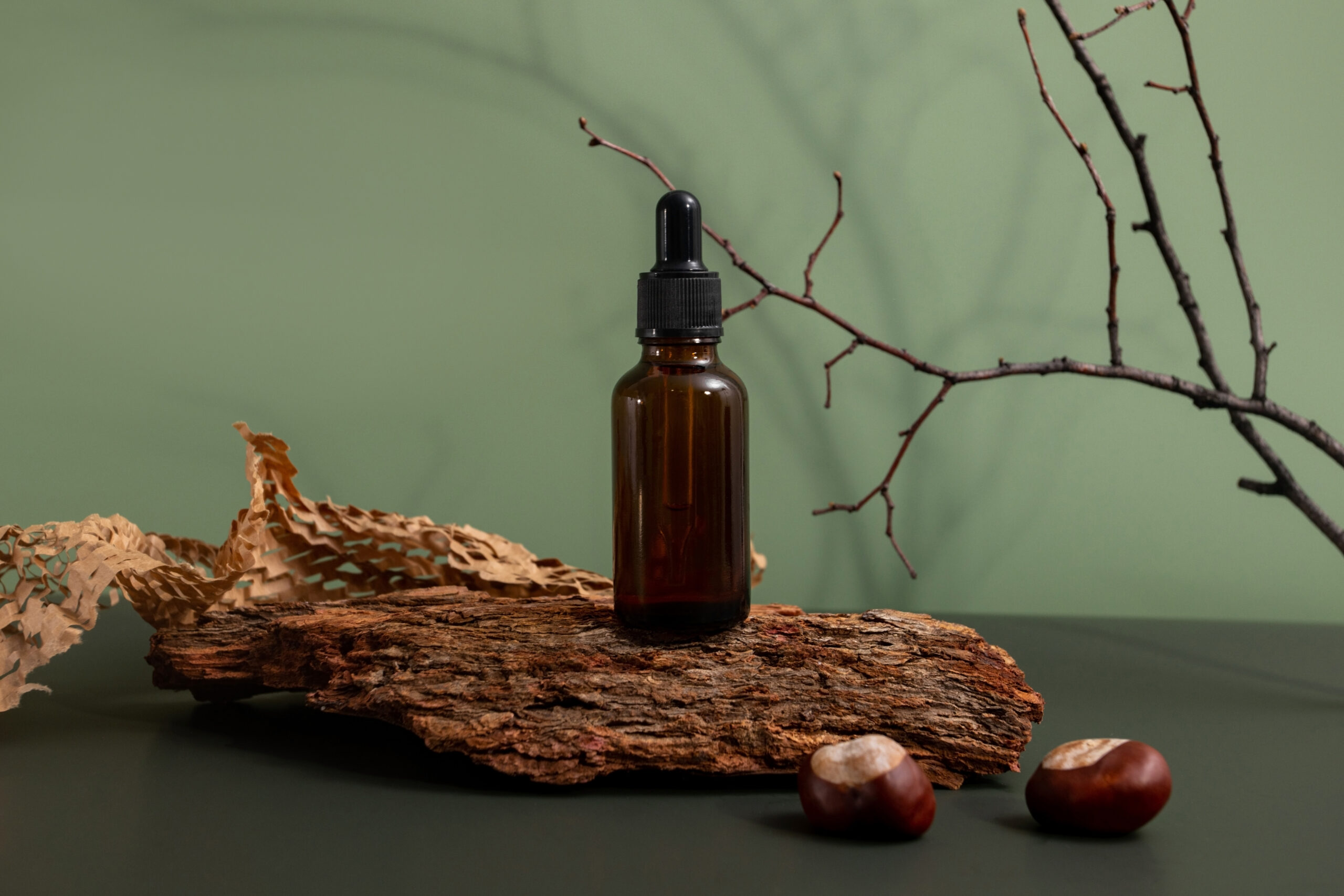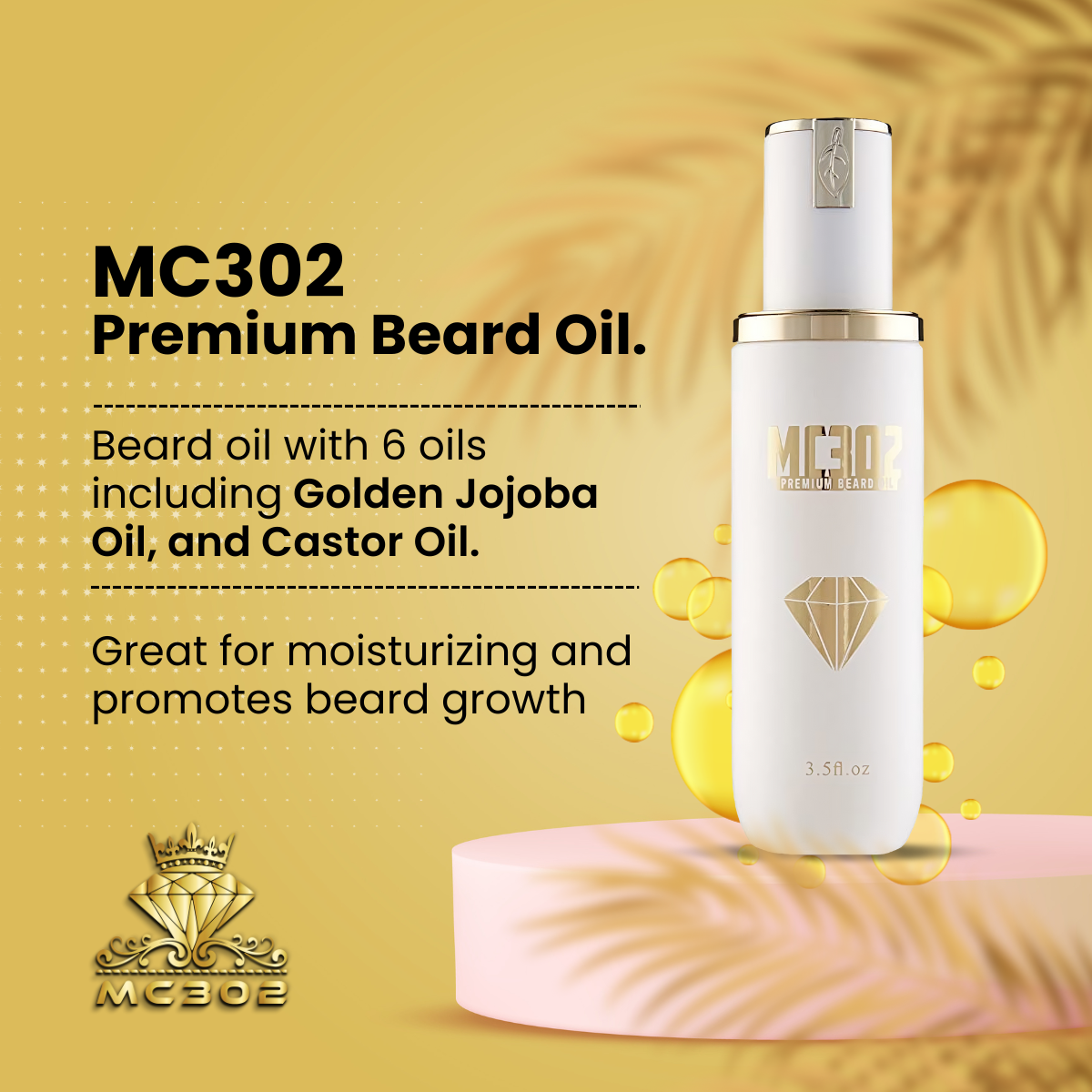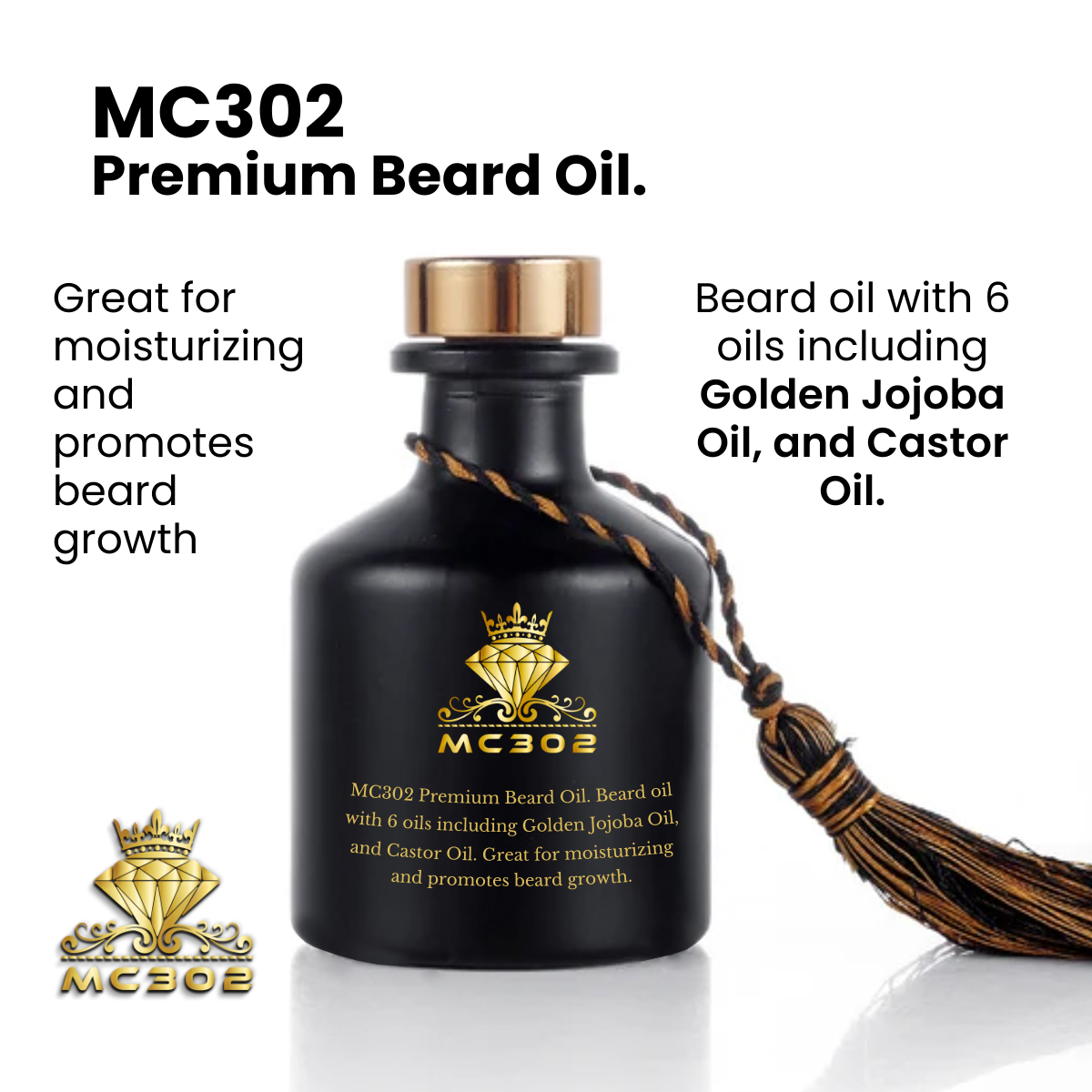What’s inside MC302’s
All About The Oils
Our beard oil provides multiple vitamins for your beard and skin. Leaving your beard soft with a wonderful smell. It moisturizes dry skin, is easy to comb through, promotes growth, decreases the chance of breakage, can fill in gaps in your beard at a cellular level, prevents baldness, prevents premature graying, and soothes inflamed and itchy skin.
Gold jojoba oil moisturizes dry skin. This star oil reduces acne by controlling oil production and preventing bacteria growth.
Using almond oil on your hair gives it a softer texture over time. Once almond oil is incorporated into your hair care routine, you may also notice that your hair is easier to comb through and style.
Hemp seed oil is rich in omega 3, 6 and 9. Hemp oil is packed with fatty acids that are necessary for maximizing hair growth. Massage with oils such as hemp also promote blood circulation.
Castor oil has moisturizing properties, which helps lubricate the hair shaft, increasing flexibility and decreasing the chance of breakage.
Neem oil Promotes hair growth and prevents baldness. Neem Oil has regenerative properties that support healthy cell division and stimulate hair follicle growth.
Black seed oil Diminishes fine lines, fights acne, unclogs pores, and fades dark. Black seed oil has been added to oils and moisturizers to improve skin moisture and hydration.



Exploring Nature’s Aromatic Essence:
The Diverse World of Terpenes
Terpene is a large and diverse class of organic compounds produced by a variety of plants, and some insects. Terpenes are primarily known for their strong odors which are often used by plants for protection against herbivores, insects, and other environmental threats. They are the primary constituents of essential oils from plants and contribute to the scent, flavor, and color of many plants.
Terpenes are a fascinating and crucial component of the natural world, with a significant impact on both ecology and human industry. Their wide array of scents and potential benefits make them a subject of ongoing interest in both scientific research and various industries.
Lean more about the ones we utilize below:
Medium chain triglycerides (MCTs) are fats that are made in a lab from coconut and palm kernel oils. Typical dietary fats are called long-chain triglycerides.
MCTs are a fat source for people who cannot tolerate other types of fats. These fats might also improve weight loss because the body can more easily break them down into molecules called ketone bodies. These ketone bodies can be used for energy.
MCT OIL WARNING
This can be a problem for people with diabetes. Avoid using MCTs if you have diabetes. Liver problems: Because MCTs are processed by the liver, they can cause serious problems in people with liver disease. Do not use MCTs if you have liver problems.
CBD isolate is a form of cannabidiol (CBD), one of the many compounds found in the cannabis plant. Unlike full-spectrum CBD products, which contain a variety of other compounds from the cannabis plant including trace amounts of THC (the psychoactive component in cannabis), CBD isolate is over 99% pure CBD. This means it has been processed to remove all other cannabis compounds and plant materials, leaving only CBD in its purest form.
Here are some key points about CBD isolate:
- Purity: CBD isolate is typically at least 99% pure CBD. It usually appears as a white, crystalline powder.
- No THC: Since it’s an isolated form of CBD, it contains no THC, the compound responsible for the “high” associated with cannabis. This makes it a preferred option for those who want to avoid THC for legal, professional, or personal reasons.
- Usage and Versatility: CBD isolate can be used in various ways. It can be ingested orally, added to foods and beverages, used to create CBD-infused products like oils or tinctures, or even applied topically. Its odorless and tasteless nature makes it versatile for incorporation into different products.
- Potential Benefits: CBD is studied for potential health benefits, including reducing anxiety, relieving pain, and improving sleep. However, it’s important to note that most research is still in the early stages, and more comprehensive studies are needed to fully understand its effects.
- Legal Status: The legal status of CBD isolate can vary depending on the country and region, often influenced by its source (hemp vs. marijuana) and THC content. In many places, CBD products derived from hemp (which contains very low levels of THC) are legal, but it’s important to check local laws.
- No “Entourage Effect”: Unlike full-spectrum CBD products, CBD isolate does not benefit from the “entourage effect” — a theory suggesting that CBD works better when used in conjunction with other cannabis compounds.
Humulene is a naturally occurring compound known as a terpene, which is found in a variety of plants, including hops (from which it derives its name), cannabis, and some types of trees. It is recognized for its distinct earthy, woody aroma and is often used in the making of perfumes and as a flavoring agent in some food products.
In the context of beard oils, humulene might be valued for its scent, contributing to the overall aromatic profile of the product. Its potential skin benefits, such as anti-inflammatory properties, could also be a point of interest, although such effects would need to be substantiated by specific product formulations and scientific evidence.
HUMULENE BENEFITS
- It could help fight cancer – The anti-cancer properties of this terpene could make it a useful tool in the battle against different forms of cancer.
- Therapeutic advantages – Since this terpene can help to alleviate pain and inflammation, it can ease the suffering with chronic conditions.
- Weight loss and eating disorders – Due to its role as an appetite suppressant, humulene may also help individuals who want to lose weight or control their eating disorders.
Myrcene, also known as β-myrcene, is a naturally occurring terpene found in a variety of plants. It is a colorless oil that is widely present in essential oils from plants such as hops, cannabis, lemongrass, and bay leaves.
Included in beard oils, myrcene can play a significant role due to its aromatic and potential therapeutic properties:
- Aromatic Qualities: Myrcene is known for its pleasant, earthy, and slightly fruity aroma. This makes it a popular choice for adding a distinct, natural scent to beard oils. The fragrance can be particularly appealing for those who prefer a musky, deep scent profile.
- Potential Skin Benefits: While the primary function of myrcene in beard oils is aromatic, some of its potential therapeutic properties could also be beneficial. For example, its anti-inflammatory properties might help in soothing irritated skin beneath the beard. However, it’s important to note that these benefits depend on the concentration and formulation of the beard oil and should be supported by specific product testing.
- Synergy with Other Oils: Terpenes like myrcene can interact synergistically with other essential oils in beard oil formulations. This interaction can enhance the overall effectiveness and scent profile of the product.
- Moisturizing Effects: Like many essential oils, myrcene may contribute to the moisturizing qualities of beard oils, helping to keep both the beard and underlying skin hydrated and healthy-looking.
- Natural Product Appeal: For brands and consumers who prefer natural ingredients, myrcene offers an appealing option. Its presence can enhance the marketability of beard oils as being made from natural, plant-based components.
Limonene is another terpene, similar to myrcene, and it is commonly found in the oils of citrus fruits like lemons, oranges, limes, and grapefruits. It’s known for its distinctively fresh and bright citrus scent, making it a popular ingredient in a variety of products, including cleaning supplies, cosmetics, and fragrances. Here’s how limonene can be particularly relevant in the context of beard oils:
- Fragrance: Limonene adds a fresh, clean, and invigorating citrus scent to beard oils. This makes it a popular choice for those who prefer a light, uplifting aroma in their grooming products.
- Skin Benefits: While limonene is primarily used for its fragrance, it may also have potential skin benefits. It has been studied for its antioxidant properties and could potentially help in protecting the skin from free radical damage. However, these benefits can vary depending on the formulation and concentration in the beard oil.
- Mood Enhancing Effects: The fresh citrus scent of limonene is often associated with mood enhancement and a feeling of refreshment. Using a beard oil with a citrus aroma could provide a pleasant and energizing experience.
- Natural Appeal: Like myrcene, limonene is derived from natural sources, making it appealing for consumers who prefer natural ingredients in their grooming products.
- Considerations for Sensitive Skin: While limonene is generally considered safe, it is important to note that some people might be sensitive or allergic to citrus-derived products. Therefore, beard oils containing limonene should be patch-tested before regular use, especially by those with sensitive skin.
Thanks to such energising and mood-boosting properties, high doses of Limonene maybe beneficial for managing symptoms associated with conditions such as Attention Deficit Disorder (ADHD), depression and chronic fatigue syndrome. It’s worth noting, this zesty terpene does not just improve mood and serotonin production. Limonene can enhance the way our bodies absorb cannabinoids and other much needed terpenes through the skin and gut.
Alpha-pinene is a terpene found in many plants, particularly in conifer trees, some citrus fruits, and herbs such as rosemary and basil. It is known for its distinctive pine-like aroma, making it a common component in the fragrance industry, as well as in flavorings, and various therapeutic applications. In the context of beard oils, alpha-pinene brings several interesting aspects:
- Aromatic Qualities: Alpha-pinene imparts a fresh, clean, and woodsy pine scent to beard oils. This aroma is often associated with outdoors and natural environments, making it appealing to those who prefer a rugged, earthy fragrance in their grooming products.
- Potential Skin Benefits: While best known for its scent, alpha-pinene also has been studied for potential anti-inflammatory and antibacterial properties. These qualities could be beneficial in beard oils, potentially helping to soothe irritated skin and maintain healthy skin beneath the beard. However, the effectiveness of alpha-pinene for these purposes in beard oil formulations would depend on the concentration and other ingredients used.
- Mood and Cognitive Effects: Some studies suggest that alpha-pinene might have mood-enhancing and cognitive function-improving effects. The scent of pine is often associated with feelings of clarity and rejuvenation, which could make using alpha-pinene enriched beard oil a more invigorating experience. It’s also present in various marijuana strains like Blue Dream and OG Kush.
- Natural and Organic Appeal: As a naturally occurring compound, alpha-pinene is often sought after by consumers interested in organic and natural grooming products. It aligns well with brands that emphasize natural ingredients and formulations.
- Synergy with Other Essential Oils: In beard oil formulations, alpha-pinene can be combined with other essential oils to create a complex, multi-layered scent profile. It pairs well with other woodsy or earthy scents, as well as with citrus or herbal notes.
Alpha-pinene is not just one of the best terpenes for anxiety but also great for improving cognitive function. It can make your brain sharper by inhibiting or reducing the activity of the enzyme acetylcholinesterase.
Alpha-phellandrene, often referred to as α-phellandrene, is a lesser-known terpene compared to its counterparts like limonene or alpha-pinene. It’s found in a variety of plants and essential oils, including eucalyptus, water fennel, and ginger grass. This terpene is characterized by a distinct, slightly minty and peppery aroma with citrusy undertones.
In the context of beard oils, α-phellandrene can have several interesting roles and benefits:
- Fragrance: The primary use of α-phellandrene in beard oils is for its unique and pleasant scent. Its minty, peppery, and slightly citrus fragrance can add a refreshing and invigorating dimension to the product, appealing to those who prefer a lively and energetic scent in their grooming routine.
- Potential Skin Benefits: While research is more limited on α-phellandrene compared to other terpenes, some studies suggest potential anti-inflammatory and analgesic properties. These characteristics could be beneficial in soothing irritated skin under the beard, although the specific effects would depend on the formulation of the beard oil.
- Mood Enhancement: Similar to other aromatic compounds, α-phellandrene may contribute to mood enhancement due to its refreshing scent. The use of beard oil with such a fragrance can be a revitalizing experience, particularly in the morning or after a long day.
- Combination with Other Oils: α-Phellandrene can be effectively combined with other essential oils in beard oil formulations to create a complex and appealing scent profile. Its unique aroma complements citrus, woody, and herbal scents well.
- Natural Ingredient Appeal: For consumers interested in natural and organic grooming products, α-phellandrene’s presence in beard oils enhances the product’s appeal. It aligns well with brands focusing on natural and botanical ingredients.
- Antifungal: a recent study published in 2017 by Ji-hong Zhang, shows the benefits of alpha-phellandrene as an antifungal. Researchers concluded that this terpene could control Pennicilium cyclopium fungus in tomatoes by measuring the ability to inhibit or prevent fungus growth. (Sun, Chen, Zeng, & Wang, 2017)
- Anticancer: in 2014 a study published in the Journal of Nutrition and Cancer showed how this terpene could decrease the viability of human liver tumor cells. (Hsieh SL; Li YC; Chang WC; Chung JG; Hsieh LC; Wu CC; 2014) In addition, recent research found comparable results in leukemia models. (Lin JJ; Hsu SC; Lu KW; Ma YS; Wu CC; Lu HF; Chen JC; Lin JG; Wu PP; Chung JG; 2016)
- Antihyperalgesic and Anti-depressive properties: a study published in 2015 showed stimulating properties of this terpene along with limonene. (Piccinelli AC; Santos JA; Konkiewitz EC; Oesterreich SA; Formaggio AS; Croda J; Ziff EB; Kassuya CA; 2015)
- Analgesic: recent studies suggest that this terpene has the ability to reduce and relieve pain. Either as a major constituent or alone, a-phellandrene outcomes showed analgesic properties. (Lima DF; Brandão MS; Moura JB; Leitão JM; Carvalho FA; Miúra LM; Leite JR; Sousa DP; Almeida FR, 2012)
Beta-Caryophyllene, often abbreviated as β-Caryophyllene, is a sesquiterpene found in many essential oils, particularly in spices like black pepper, cloves, and cinnamon, as well as in cannabis. It is notable for its spicy, woody aroma and is one of the few terpenes that directly interacts with the endocannabinoid system in the human body, particularly the CB2 receptors. This unique interaction gives β-Caryophyllene some interesting potential applications in beard oils:
- Aromatic Properties: β-Caryophyllene contributes a rich, spicy, and woody note to beard oils. This can add a warm, inviting scent that is especially appealing in men’s grooming products. The aroma is often associated with masculinity and can offer a unique fragrance profile that sets a beard oil apart from others.
- Potential Skin Benefits: Research has indicated that β-Caryophyllene may have anti-inflammatory and analgesic properties. These properties could be beneficial in beard oils, potentially helping to soothe and calm irritated skin under the beard. It’s important to note, however, that the efficacy of β-Caryophyllene in topical applications like beard oil depends on the concentration and the formulation of the product.
- Synergistic Effects with Other Ingredients: In beard oil formulations, β-Caryophyllene can work synergistically with other essential oils and ingredients to enhance the overall effect and scent of the product. It pairs well with citrus, floral, and other woody scents, providing a complex and layered fragrance.
- Natural and Holistic Appeal: Given its natural occurrence in spices and plants, β-Caryophyllene aligns well with beard oils marketed as natural or holistic. Its interaction with the endocannabinoid system also adds a unique point of interest, particularly for consumers interested in the therapeutic aspects of natural ingredients.
- Considerations for Formulation: As with any active compound, the formulation of β-Caryophyllene in beard oils should be done carefully to ensure it is effective and safe. While it is generally considered safe, as with all essential oils and active ingredients, it’s important for users, especially those with sensitive skin, to do a patch test before using it regularly.
In summary, β-Caryophyllene can be a valuable addition to beard oils, offering both a distinct aroma and potential skin-soothing properties. Its inclusion in a beard oil formula should be carefully considered to balance its benefits with the overall product composition and intended use.
Linalool is a naturally occurring terpene found in a wide variety of plants, including lavender, mint, cinnamon, and some citrus fruits. It is renowned for its pleasant floral scent with a hint of spiciness, making it a popular ingredient in perfumes, scented products, and flavorings. In the context of beard oils, linalool offers several notable properties and benefits:
- Fragrance: Linalool imparts a calming, floral aroma to beard oils, often associated with the scent of lavender. This makes it desirable in products aiming for a soothing, gentle, and pleasant fragrance profile.
- Potential Skin Benefits: Linalool has been studied for various potential therapeutic properties, including anti-inflammatory and antimicrobial effects. These properties can be beneficial in beard oils, potentially helping to soothe irritated skin and provide a degree of protection against certain skin irritants and microbes.
- Relaxation and Stress Relief: The scent of linalool is often linked to relaxation and stress relief. Using beard oil containing linalool might provide a calming experience, which can be particularly enjoyable as part of a nighttime grooming routine.
- Natural and Holistic Appeal: Given its natural occurrence in many plants, linalool aligns well with beard oils marketed as natural or holistic. It enhances the appeal for consumers who prefer products with organic or plant-based ingredients.
- Synergistic Effects with Other Oils: Linalool works well in combination with other essential oils and ingredients in beard oil formulations. It can complement both floral and citrus notes, contributing to a complex and layered fragrance profile.
- Considerations for Sensitive Skin: While linalool is generally considered safe, some individuals may have sensitivities or allergies to it, especially in its concentrated form. It’s important for users, especially those with sensitive skin, to do a patch test before using beard oils containing linalool regularly.



